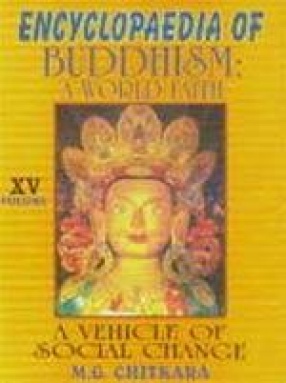In the economic, political and social fields. Buddha had prescribed the ideal of service. He had called those who did not confirm to this ideal as "useless consumers of the nation’s wealth" (mogham sa ratthapindam Buhnjati). He enjoined the system of economic communism in the community of monks and nuns. Apart from the eight items (of personal use), such as clothing, the begging bowl, etc., all other things were considered to be the property of the commune (samgha). The houses, gardens, small agricultural and other implements, bed, stead, beddings, etc., were all considered to be property for benefit of the society. Socio-cultural political changes may be attributed to individuals. However, any understanding of social roles in bringing about change has to be explained in the context of organisational structures. For an individual, norm conformity goes with success in a social system. In the days of Buddha whatever land was donated was given to the "present and future commune of the four directions" ( agata anagata chatudisasa samghasa) alone. Consequently the changes were brought in the devolution of property rights. Many significant changes were brought into society. Approaches to problems may differ because there are differences in the theoritical frameworks between humanities and social sciences. Buddhist philosophy has made vital and important contributions which should be utilized for the development of science of sociology and politics. The Buddhist concept of lay morality, its conception of caste, its views about the origin of the state and Government and the techniques adopted by the Buddha and Buddhist kings for the maintenance of the stability of Suttas and Sutras read to be put to practice. Buddhism is a faith which is a most magnificent crystallization of Indian philosophy of Vedas. The fact remains that the short memory of a human being blunts the old faith Shankaracharya, haling from Kerala, wandered all over the country on foot and enriched the land with his preachings embodied in Advaita Vedanta. Advaita Vedanta unfolds the reality that everything other them God is illusion and inspires for actions without wishing any benefits in return. Gautama attained enlightenment and believed that "alone am I, a supreme Buddha". He thought that there is "none to rival me among men and Gods". That means "Aham Brahma" Gita saw all beings as undivided and perceived from God i.e. unity in diversity. Buddhism never refused to accept, rework and transform the ideas of other people. "Some Mahayana schools had affirmed that the Buddha and all living beings were identical in essence". Buddha is also called Tathagata. It means the one who has thus gone i.e., one who has reached the truth and come to declare it; the highest epithet of a Buddha. His initials missionary activities were brought to bring in the Buddhist order. This order had three functions to develop these objectives. 1. Members of the order must strive to perfect themselves in faith and practice. 2. They (members of the order) must strive to attain self-perfection. 3. An order must transmit a correct teaching in a correct way. May the righteous law of Buddha last forever. Buddhism too teaches doctrines of karuna, transmigration, cause and effect of past, present, and future. The purpose is that in the world of transmigration, evil karuna and unhappiness must be eliminated from the society. While Buddhism was flourishing, there was an ominous parallel development. The caste ideology was being sharpened. In Buddhism the structure of the universe is ethical and as other actions produce their own results, ethical action too produces its own proper results sooner or later. Buddha stressed the very important philosophical principal of the purity of means. The ends must be pure and so should also be the means. Social life was built around the philosophy of Lotus Sutra. Buddha mandates that you should live in the world, but remain untouched by it. You should remain in the world, but the world should not remain in you. You should pass through the world without carrying any impression, any impact, any scratch.
Encyclopaedia of Buddhism: A World Faith: A Vehicle of Social Change (Volume XV)
In stock
Free & Quick Delivery Worldwide
reviews
Bibliographic information
Title
Encyclopaedia of Buddhism: A World Faith: A Vehicle of Social Change (Volume XV)
Author
Edition
1st Ed.
Publisher
ISBN
8176481947
Length
xviii+622p.
Subjects








There are no reviews yet.